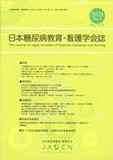Japanese
English
- 有料閲覧
- Abstract 文献概要
- 参考文献 Reference
本研究の目的は,1型糖尿病をもつ子ども/青年のQOLに,親のQOLや血糖コントロール等の要因がどのように関連しているかを明らかにし,看護援助への示唆を得ることである.小学校3年生以上22歳までの1型糖尿病をもつ子ども/青年474名とその親を対象に,子ども/青年の「生活の満足度:HR-QOL」と「糖尿病に関連した満足度:DR-QOL」,「親の生活の満足度:PDQOL」,「親の糖尿病と疾患管理の負担」,「親の糖尿病管理へのかかわり」,HbA1c,罹病期間,年齢について回答を求めた.各変数の相関関係を検討しながらパス解析を行い,モデル適合度判定に基づきモデルを修正した.その結果,小中学生の子どもでは,子どもの年齢と「生活の満足度:HR-QOL」,「親の糖尿病管理へのかかわり」のパスが有意であり,年齢が高いほど生活の満足度は低下し,親のかかわりは減少した.また,「親の生活の満足度:PDQOL」,「親の糖尿病と疾患管理の負担」,「親の糖尿病管理へのかかわり」間には有意なパスがあり,加えてこれらの親の各変数から子どもの「生活の満足度:HR-QOL」へのパスも有意であった.HbA1cは,「親の糖尿病と疾患管理の負担」とのみ有意なパスがみられた.一方,高校生以上の青年においては,年齢および青年の「生活の満足度:HR-QOL」,「親の糖尿病管理へのかかわり」間のパスは有意ではなかった.HbA1cは,「親の糖尿病と疾患管理の負担」と青年の「生活の満足度:HR-QOL」に有意なパスがみられた.修正したモデルの適合度は高く,1型糖尿病をもつ子ども/青年と親のQOLおよびHbA1cの関連が検証され,子ども/青年と親のQOLを高める看護援助への示唆が得られた.
The purpose of this study was to clarify the causal association between quality of life (QOL) of children and adolescents with type 1 diabetes and their parents' QOL and metabolic control. Participants comprised 474 children and adolescents (age 9-22 years) with type 1 diabetes and their parents. Data were collected using 5 questionnaires: health-related QOL for children/adolescents; diabetes-related QOL for children/adolescents; parents diabetes QOL; family burden related to diabetes; family involvement in diabetes management; and HbA1c, duration of diabetes and age of children/adolescents. Path analysis was conducted following examination of the correlations between these factors, and the causal model was revised using judgment fitness indices. The following results were obtained : In elementary and junior high school children with type 1 diabetes, there were significant correlations between age and health-related QOL and family involvement in diabetes management. Older children had lower health-related QOL and decreased family involvement in diabetes management. There were also significant correlations among parents diabetes QOL, family burden related to diabetes and family involvement in diabetes management, and there were significant correlations between these parental factors and children's health-related QOL. HbA1c was significantly correlated only with family burden related to diabetes. In adolescents of high school age and older, there were no significant correlations between age and health-related QOL or family involvement in diabetes management; however, HbA1c was significantly correlated with both family burden related to diabetes and health-related QOL. The results of the present study showed favorable fitness indices for the revised model. This causal model will enable the development of nursing interventions for improving QOL of children and adolescents with type 1 diabetes and their parents.
Copyright © 2010, Japan Academy of Diabetes Education and Nursing. All rights reserved.


